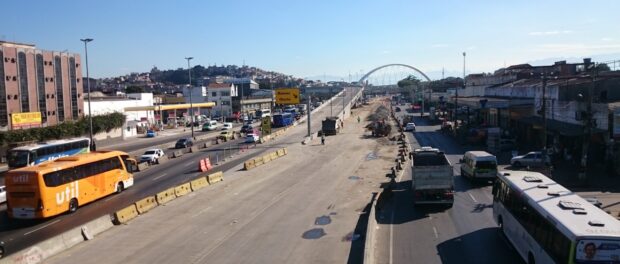
A year after the Olympics in Rio de Janeiro, little is said about the Olympic legacy left for residents of the Maré Complex of favelas, one of the largest in Rio with over 140,000 residents.
Mobility
Since the preparations for the Olympics, changes and construction works have become part of cariocas’ routine. One public transport initiative that impacted the territory was the construction of the TransBrasil BRT (Bus Rapid Transit) route on Avenida Brasil, whose construction stopped during the Games and resumed in April this year. The BRT is not a conventional bus. At first it will have bi-articulated buses, about 16 stations and 18 footbridges. The prospect of clear traffic is still the hope of many, like Willian Gomes, age 22, who lives in Maré and takes the bus daily. “My expectations are positive. This will really help people get to work, to college and home, for example, since public transport does not favor us alongside the road traffic at peak times and days,” he says.
Maré already has two nearby stations: Santa Luzia Station and Maré Station, which operate 24 hours a day, as do their ticket offices–which facilitates the movement of people from nearby neighborhoods. While the works are not completed, traffic jams remain chaotic. Rio’s Traffic Engineering Company (CET-Rio) announced a ban on access to the Penha neighborhood and Washington Luiz Highway in the first week of August, which had slow traffic on the action’s first working day.
Public Security
The government and press have linked declining public safety investment to increased violence in the formal city and in favelas. The experience of Maré in 2014 does not represent this correlation, however. R$600 million were spent in a year and a half of military occupation, aiming at the control of the territory and people who live in it, to then install the UPP. But the UPP installation was canceled in 2016 by former Public Security Secretary José Mariano Beltrame, who alleged lack of funds to continue the project. On the other hand, in seven years, the City government has invested only R$350 million in social programs. These values reflect the contrast between the authorities’ and the population’s priorities.
With social and moral pressure, public security spending continues. Defense Minister Raul Jungmann confirmed the presence of the Army, Navy and Aeronautics in support of the Armed Forces and the Police in operations until December 2018. They are already on the streets of Copacabana, other neighborhoods and on the Red Line Highway, Yellow Line Highway and Avenida Brasil expressway. And the behavior in their actions is questionable and unequal in rich and poor areas of the city, such as the disrespect when searching black men for example.
At the time of the occupation of Maré, a study was conducted on its impact, resulting in the book, in Portuguese, “The Occupation of Maré by the Brazilian Army: Residents’ Perception on the Occupation of the Armed Forces”, launched in May this year by Redes de Desenvolvimento da Maré. One of its findings was that, out of a thousand interviewees, 60% feel safer in the favela than in the rest of the city. And with this sense of belonging, local actions took place after the Games, empowered to do what militarization has been unable to do: foster culture, leisure, education and commerce.
Community Initiatives, Youth and Studies
One of the initiatives that succeeded was the Maré 0800 store, opened in September 2016 to gather books, clothes, shoes and other donated objects–a way to share with other local residents and the rest of the city–as a solidarity network. Residents including community communicators themselves organize the event, whose eighth edition took place last Saturday, August 12, at Vila do João, one of the favelas in the Maré complex. Each event takes place in a different part of the community, as a way to democratize access to the action. “Children’s materials such as toys, clothes and books are the most successful,” says Anderson Cabo, one of the collaborators, who believes in encouraging reading.
The more the better. According to a study by the Popular Data Institute, 5% of favela community residents in Brazil have higher education. And in 2017, Maré’s youth shows the strength it has to improve these statistics by studying and sharing learning.
One of the tools used is the College Exam Preparatory Course run by ground-breaking community NGO Redes da Maré, which has already helped more than a thousand residents to realize the dream of going to university for free. Amanda Araújo lives in Maré and studies Social Communication at the State University of Rio de Janeiro (UERJ). “Passing the entrance exam was a very happy moment. I studied a little every day. The cultural part of the classes was very rich. I started to study in a very different way,” she says, eager to return to class.
In the midst of all the social problems present in Maré and throughout Brazil after the Olympics, the power of the people is visible through their own struggles and daily pursuits which motivate us to continue resisting.
Thaís Cavalcante was born and raised in Nova Holanda, one of the favelas comprising the Maré favela complex. Through her youth working as a community communicator, Thaís decided to pursue a journalism degree and believes in the power of information to change her community’s reality.



